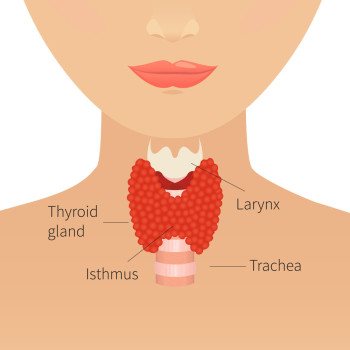Overactive thyroid (hyperthyroidism) Repe tenga hoehe rawa
Your thyroid is a gland in your neck that produces hormones. Sometimes it can produce too much thyroid hormone, which causes your body's metabolism to speed up. This can lead to a range of symptoms.
Causes of an overactive thyroid
Your thyroid produces 2 thyroid hormones — tri‑iodothyronine (T3) and thyroxine (T4). These help your body use energy and stay warm. They keep your brain, heart, muscles and other organs working as they should.
There are several causes for an overactive thyroid.
Graves' disease is the most common cause. This is an autoimmune disease.
Your immune system usually fights off infections but when you have an autoimmune disease like Graves', your immune system attacks your own cells. Your body makes a tiny protein (antibody) that attaches to your thyroid, causing it to make too much thyroid hormone. We do not know what triggers this, but it sometimes runs in families.
Thyroid nodules (lumps) can also produce too much thyroid hormone. There can be a single nodule or several, which is known as multinodular goitre (enlarged thyroid).
Rarer causes include an inflammation of the thyroid known as thyroiditis and some medicines, such as lithium or amiodarone.
An overactive thyroid is more common in women than men and can happen at any age.
Location of your thyroid gland

Symptoms of an overactive thyroid
Symptoms of an overactive thyroid include:
- feeling nervous or anxious
- shaking
- sweating more than usual
- have a racing heartbeat or palpitations
- losing weight without changing your diet or your activity levels
- tiredness and muscle weakness
- a swollen thyroid gland (a goitre).
- difficulty sleepy
- runny poos (diarrhoea)
- lighter periods if you are a woman.
You may also get problems with your eyes such as:
- irritation and redness
- bulging eyes
- double vision.
Diagnosing an overactive thyroid
A blood test measures your thyroid hormones and TSH (thyroid stimulating hormone). TSH is a hormone that controls how much thyroxine you make. It is made by your pituitary gland at the base of your brain. If your thyroid is already making too much thyroxine, your TSH will be low.
Understanding your thyroid function results
A blood test can diagnose Graves’ disease by showing thyroid antibodies.
If the blood test does not show antibodies, you may need a radionuclide thyroid scan to determine the underlying cause of your thyroid overactivity.
Complications of an overactive thyroid
If an overactive thyroid is left untreated for a long time, you can develop thin and weak bones (osteoporosis).
Treating an overactive thyroid
The treatment options for an overactive thyroid include:
- medicines
- radioactive iodine
- surgery.
The treatment you will need depends on the cause of your overactive thyroid and how well it responds to the treatment.
You may also need treatment if you have thyroid eye disease. Treatment for this may include drops, special glasses, medicines and rarely, surgery.
Anti‑thyroid medications like carbimazole reduce the amount of thyroxine that your thyroid produces. They usually take several weeks to bring your levels back to normal.
You often start on a high dose, which can be reduced once your thyroxine levels have dropped. You will usually keep taking carbimazole for at least 12 to 18 months.
If your thyroid overactivity is due to Graves’ disease, there is about a 1 in 2 chance that the overactivity will go away after this time, meaning you can stop taking carbimazole.
If the overactivity does not go away, or if the overactivity comes back again in the future, other treatments are usually considered. Some people keep taking carbimazole for several years.
If you have a high temperature, sore throat or mouth ulcer, stop taking your thyroid medicine and see your healthcare provider urgently to have a blood test.
You might also need to take a medicine called a beta blocker. This does not affect your thyroid but helps with some of the symptoms, such as the shakes (tremor), racing heart (palpitations), and nervousness.
Radioiodine treatment uses radioactive iodine to destroy thyroid cells. You will take radioiodine as a liquid or capsule. It takes several weeks to be effective and is successful in most people.
The treatment is very safe but you need to take precautions when taking radioiodine to protect people around you.
Sometimes people need surgery to remove part or all of their overactive thyroid. Surgery is particularly useful if you have a very large thyroid or if other treatments have not worked.
Thyroid surgery is generally very safe but can have some side effects, such as affecting your calcium balance or damaging your vocal cords.
After surgery, your thyroid may become underactive (hypothyroidism). You will have blood tests to check for this and it is easily treated with thyroid tablets.
Underactive thyroid (hypothyroidism)
Self care for an overactive thyroid
There are some things you can do to cope with an over active thyroid and help your body heal.
- Get regular exercise — exercise can help you feel better, improve muscle tone and keep your heart and lungs healthy. It can also can help you feel more energetic.
- Learn relaxation techniques — these can help you keep a positive outlook. Stress is a risk factor for Graves' disease in particular. Learning to relax and find a sense of calm will help support your physical and mental wellbeing.
Manage your stress — Small Stepsexternal link - Avoid having too much iodine — do not take kelp supplements or eat seaweed products regularly (commonly used in sushi and other Japanese foods). These are high in iodine, which can make hyperthyroidism worse. You can still use iodised salt and eat bread and seafood.